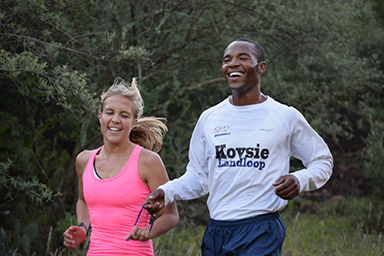Latest News Archive
Please select Category, Year, and then Month to display items
10 March 2022
|
Story Anthony Mthembu
|
Photo Unsplash
 The No Student Hungry team gearing up to start distributing food parcels to the selected students.
The No Student Hungry team gearing up to start distributing food parcels to the selected students.
The UFS is one of the many institutions of higher learning where food insecurity is an active issue. However, the
No Student Hungry Programme is one of the initiatives launched at the university to assist in fighting food insecurity at the institution.
The purpose of the programme
Since its inception in 2011, the initiative has assisted many students in acquiring a healthy meal. Additionally, the Food Environment Office also hands out food packages, so that students can continue to achieve academically. “We are trying to develop a healthy environment for students and make it easier for them to have a nice and healthy meal,” stated Annelize Visagie, who heads the Food Environment Office at the UFS. The Food Environment programme is spread out on all three campuses, each with its own facilitators. Furthermore, the programme mainly caters for students who are not funded by the National Student Financial Aid Scheme (NSFAS) but who are excelling academically. The abovementioned students apply for assistance online, and a list is then drawn up of students who receive assistance for the year.
Alternative solutions to keep the initiative running
On the Bloemfontein Campus, the No Student Hungry Programme will be catering for 200 students in the 2022 academic year, assisting them with a daily nutritious meal. Additional food parcels are also handed out to provide further assistance. “We give food parcels to the students on the list every Tuesday and Thursday at the Thakaneng Bridge,” Visagie highlighted. However, she argues that catering for the student population through this programme can be a challenge, as the demand for assistance is growing rapidly and the ability to assist is limited. The programme relies on partnerships and sponsors to assist the student body. In fact, the coordinators of the programme currently have a memorandum of understanding with Tiger Brands according to which they deliver around 100 food parcels for distribution.
In addition, the coordinators have put in place alternative measures to ensure that they can provide more food to students. “The
Kovsie Act Office, in partnership with the
Department of Sustainable Food Systems and Development, has started a food garden where healthy and nutritious produce are grown, in order to add value to the distribution,” she indicated. Although the programme can only assist to a point, students who are in desperate need of assistance are never turned away. In fact, the
Social Support Unit at Thakaneng Bridge usually assists students with food vouchers for a maximum of four days.
A commitment to teaching healthy eating habits
The programme is not only committed to curbing food insecurity, but also to ensuring that students have a healthy and balanced diet. As such, a booklet is being issued by the
Department of Nutrition and Dietetics in collaboration with the Department of Sustainable Food Systems and Development, which contains ways in which students can make a healthy meal using some of the ingredients offered in the food parcels.
“We want to teach students how to eat healthy in the cheapest way, because they don’t have a lot of money to buy expensive food products,” Visagie argued.
Louzanne Coetzee heading for Paralympic Games in Rio
2016-08-02

Louzanne Coetzee (left) from the University of the
Free State and her guide Khothatso Mokone, a former Kovsie,
will compete in the Paralympic Games in Rio de Janeiro,
Brazil, from 7 to 18 September 2016.
Photo: Rufus Botha
Her perseverance and faith. Faith in herself and her coaches, as well as her Christian faith. Rufus Botha says this is what makes the Paralympic athlete Louzanne Coetzee special. According to her coach, the 23-year-old star from the University of the Free State (UFS) is easy to work with. “Her work ethic is incredible. As coach, I actually have to stop her,” he jokes. “She does not like to rest.”
On 19 July 2016, Coetzee was included in South Africa’s Paralympic team for the Olympics in Rio de Janeiro, Brazil. She and her guide Khothatso Mokone, also a former Kovsie, were included in the team that will participate in Rio from 7 to 18 September 2016.
Sights still set on 2020 Olympics
In Brazil, Coetzee will compete in the T11 category in the 1 500 m. The blind athlete is also outstanding in the 800 m and 5 000 m, of which she is the world record holder, but these items do not feature at the Olympics.
Botha says Coetzee has her sights still set on the 2020 Paralympic Games in Tokyo, Japan. “Anything she achieves in Rio will actually be a bonus.” He says it was an achievement on its own to be included in the SA team among established athletes such as Arnu Fourie and Ilse (Hayes) Carstens.
CUADS super proud of record-breaker
“Anything she achieves in Rio
will actually be a bonus.”
“Louzanne is an absolute star and an example to so many Kovsie students,” says Martie Miranda, Head of the Centre for Universal Access and Disability Support (CUADS) at the UFS. “We are super proud of her.”
On 17 July 2016, Coetzee set a new Africa record (5:00:25) in the 1 500 m in Berlin. She will leave for Rio on 30 August 2016, with her heat taking place on 15 September 2016 and the finals on 17 September 2016.